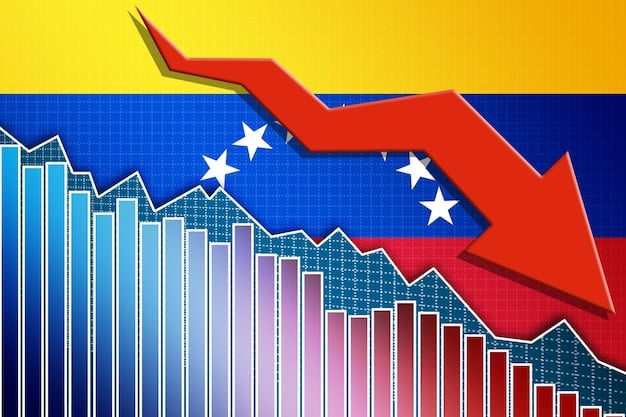US Sanctions Against Russia: Latest Updates & Economic Impact

class=”summarization”>US sanctions against Russia have intensified recently, targeting key sectors and individuals, leading to significant economic consequences for both Russia and the global economy.
The **US Sanctions Against Russia: What are the Latest Developments and Economic Consequences?** have evolved significantly since their initial implementation. These measures, designed to deter aggressive actions and uphold international law, have become a central tool in the US foreign policy arsenal.
A Brief History of US Sanctions on Russia
US sanctions against Russia are not a new phenomenon. They have a history of evolving in response to various geopolitical events and shifts in the relationship between the two countries. Understanding this history provides context for the latest developments.
The Cold War Era
During the Cold War, sanctions were a frequent tool used by the US to limit the Soviet Union’s economic and military power. These measures targeted technology transfer and strategic resources.
Post-Soviet Era
After the collapse of the Soviet Union, sanctions were eased but reinstated periodically in response to specific actions by Russia, such as human rights violations or regional conflicts. The Magnitsky Act is a key example.

Key Milestones
- Early Sanctions: Initial measures targeted Soviet technological and military capabilities.
- Post-Cold War Adjustments: Sanctions were refined to address specific Russian behaviors.
- The Magnitsky Act: Imposed sanctions on individuals responsible for human rights abuses.
The historical context shows a consistent pattern of the US using sanctions as a tool to influence Russia’s behavior on the global stage. This background is crucial for understanding the nuances of the current sanctions regime.
Latest Developments in US Sanctions
In recent years, **US Sanctions Against Russia: What are the Latest Developments and Economic Consequences?** have become more extensive and impactful. These measures target key sectors of the Russian economy, as well as individuals close to the Kremlin.
Response to the Ukraine Conflict
The US has imposed increasingly severe sanctions in response to Russia’s actions in Ukraine, including the annexation of Crimea and the ongoing conflict in the Donbas region.
Targeting Key Sectors
The energy, financial, and defense sectors have been particular targets of US sanctions. These measures aim to limit Russia’s ability to fund its military and pursue its foreign policy objectives.
Recent Expansions
- Financial Institutions: Sanctions on major Russian banks limit their access to international capital markets.
- Energy Projects: Restrictions on technology and investment in Russian energy projects.
- Individual Sanctions: Targeting individuals with close ties to the Russian government.
The latest developments in US sanctions demonstrate a clear strategy of applying economic pressure on Russia to alter its behavior. These measures are designed to have a broad and deep impact on the Russian economy.
Economic Consequences for Russia
The economic consequences of **US Sanctions Against Russia: What are the Latest Developments and Economic Consequences?** are far-reaching and multifaceted. These sanctions have had a significant impact on Russia’s economic growth, investment climate, and access to international markets.

Impact on GDP Growth
Sanctions have contributed to slower GDP growth in Russia, limiting its ability to modernize its economy and improve living standards. The restrictions on technology transfer and investment have been particularly damaging.
Investment Climate
The sanctions have deterred foreign investment in Russia, as companies fear the risk of being targeted themselves. This has reduced the flow of capital into the country and limited its access to new technologies.
Financial Market Effects
- Currency Devaluation: Sanctions have contributed to the devaluation of the Russian ruble, increasing the cost of imports and fueling inflation.
- Reduced Access to Capital: Russian companies and banks have found it more difficult and expensive to raise capital in international markets.
- Increased Inflation: The rising cost of imports and other factors have led to higher inflation rates in Russia.
The economic consequences for Russia are substantial and have led to increased pressure on the government to address the challenges posed by the sanctions. The long-term effects of these measures remain to be seen, but they are likely to continue to shape Russia’s economic trajectory.
Global Economic Impact
The impact of **US Sanctions Against Russia: What are the Latest Developments and Economic Consequences?** is not limited to Russia alone. These measures have had ripple effects on the global economy, affecting trade, energy markets, and international relations.
Trade Disruptions
Sanctions have disrupted trade flows between Russia and other countries, leading to higher costs for consumers and businesses. The restrictions on certain goods and services have created new challenges for global supply chains.
Energy Market Volatility
The sanctions on Russia’s energy sector have contributed to volatility in global energy markets. Reduced supply and increased uncertainty have led to higher prices and concerns about energy security.
Geopolitical Tensions
- Strained Relations: Sanctions have strained relations between the US, Russia, and other countries.
- Increased Uncertainty: The use of sanctions as a foreign policy tool has increased uncertainty in the global economy.
- Search for Alternatives: Some countries are exploring alternative payment systems and trade routes to bypass US sanctions.
The global economic impact of US sanctions on Russia is significant and complex. These measures have created new challenges and opportunities for countries around the world and have highlighted the interconnectedness of the global economy.
Alternatives to Sanctions
While sanctions are a common tool in international relations, there are alternative approaches that could be used to address concerns about Russia’s behavior. These alternatives include diplomacy, negotiation, and targeted assistance.
Diplomacy and Negotiation
Engaging in direct diplomacy and negotiation with Russia can help to address specific issues and find common ground. This approach requires a willingness to listen and compromise on both sides.
Targeted Assistance
Providing targeted assistance to countries affected by Russia’s actions can help to mitigate the negative consequences and promote stability. This approach can include financial aid, technical assistance, and security cooperation.
International Cooperation
- Multilateral Approach: Working with other countries to address concerns about Russia’s behavior can increase the effectiveness of any measures taken.
- Dialogue and Engagement: Promoting dialogue and engagement with Russia can help to build trust and reduce tensions.
- Focused Objectives: Clearly defining the objectives of any measures taken can help to ensure that they are effective and targeted.
Alternatives to sanctions can offer a more constructive and sustainable way to address concerns about Russia’s behavior. These approaches require patience, persistence, and a willingness to engage in dialogue and cooperation.
Future of US-Russia Relations
The future of US-Russia relations is uncertain, but it is likely to be shaped by the ongoing conflict in Ukraine, the impact of sanctions, and the broader geopolitical landscape. Finding a way to manage these challenges and build a more stable relationship will be essential for both countries and the world.
Potential Scenarios
Various scenarios are possible for the future of US-Russia relations, ranging from continued tensions and confrontation to a gradual improvement in ties. The outcome will depend on the choices made by leaders in both countries.
Importance of Dialogue
Maintaining open channels of communication and engaging in dialogue is crucial for managing the relationship and preventing misunderstandings. This can help to build trust and identify areas of common interest.
Key Considerations
- Ukraine Conflict: Resolving the conflict in Ukraine is essential for improving US-Russia relations.
- Sanctions Policy: The future of sanctions will depend on Russia’s behavior and the broader geopolitical context.
- Global Cooperation: Finding ways to cooperate on issues of mutual interest, such as counterterrorism and nuclear nonproliferation, can help to build a more stable relationship.
The future of US-Russia relations will have a significant impact on the global landscape. Finding a way to manage the challenges and build a more stable relationship will be essential for promoting peace, security, and prosperity around the world.
| Key Point | Brief Description |
|---|---|
| 📉 Economic Impact | Sanctions slow Russian GDP growth and reduce foreign investment. |
| ⚡ Energy Sector | Sanctions impact Russia’s energy projects and contribute to market volatility. |
| 🤝 Alternatives | Diplomacy and targeted assistance offer alternatives to economic sanctions. |
| 🌍 Global Tensions | Sanctions strain US-Russia relations and affect global trade dynamics. |
Frequently Asked Questions
▼
The primary goals include deterring aggressive actions, upholding international law, and encouraging changes in Russian behavior related to human rights and regional conflicts.
▼
The energy, financial, and defense sectors are the most targeted. These sectors face restrictions on technology, investment, and access to international capital markets.
▼
Sanctions can disrupt trade flows, contribute to energy market volatility, and strain international relations, leading to increased uncertainty in the global economy.
▼
Yes, alternatives include diplomacy, negotiation, targeted assistance to affected countries, and fostering international cooperation to address concerns about Russia’s actions.
▼
The future remains uncertain, largely influenced by the ongoing conflict in Ukraine. Dialogue and global cooperation will be essential for managing challenges and fostering stability.
Conclusion
The **US Sanctions Against Russia: What are the Latest Developments and Economic Consequences?** represent a complex and evolving aspect of international relations. While these measures aim to influence Russian behavior and uphold international norms, they also carry significant economic and geopolitical implications. Understanding the historical context, recent developments, and potential alternatives is crucial for navigating the challenges and opportunities that lie ahead. As the situation continues to unfold, international cooperation and dialogue will be paramount in shaping the future of US-Russia relations and the broader global landscape.





